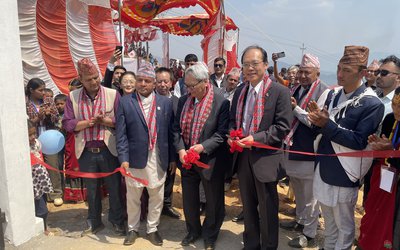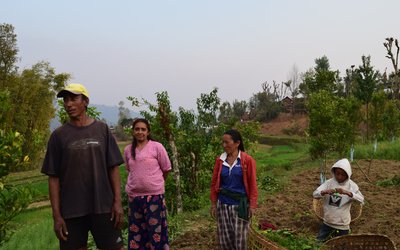United Nations World Food Program (WFP) in collaboration with the Ministry of Home Affairs (MOHA) organized a three-day simulation exercise (SIMEX) on early warning, emergency preparedness, response and capacity building for natural disasters concluded in Kathmandu.
The SIMEX brought together representatives from the Government, UN agencies, non-governmental organizations (NGOs) and the private sector to strengthen the capacity of disaster management stakeholders and to better link early warning with preparedness and response.
The simulation is part of projects funded by Australian Aid, Australian Government- Department of Foreign Affairs and Trade, and German Federal Foreign Office (GFFO). The event was appropriately organized at the Humanitarian Staging Area in Kathmandu – a space developed by WFP with the support of DFID that opened shortly before the 2015 earthquakes to facilitate the logistics of a humanitarian response in the event of a disaster.
Addressing the closing ceremony, Head of Disaster Management Division and Joint Secretary, Ministry of Home Affairs, Krishna Bahadur Raut said, “WFP has been supporting the Government of Nepal in mitigating and managing risks induced by disasters, by organising several emergency trainings to government and other humanitarian agencies to develop national capacity in the area of emergency preparedness and response.”
“Nepal is among the top ten most disaster-affected countries in the world, both in terms of mortality and number of events,” said Francesca Caponera, Deputy Country Director of WFP in Nepal. “Often there are localized, recurrent disasters that can threaten sustainable development – for example by damaging vital infrastructure or destroying livelihoods. WFP wants to support national stakeholders’ capacities to save lives and livelihoods. This training is unique as it focuses on three vital elements- early warning, preparedness and response which is key to reduce impacts of disasters.”
Speaking at the closing event, Dolakh Dangi from Nepal Red Cross Banke Chapter said, “the SIMEX provided an opportunity for relevant disaster management stakeholders to review their organisation’s level of preparedness, practice their response, decision-making processes, protocols and procedures. It helped build their capacity to respond to emergencies in a timely manner”.
“Attendees participated in various activities and logistics drills, including a realistic disaster scenario based on the 2014 floods that severely affected the Mid- and Far-Western Terai districts. The exercise also worked to build skills in decision-making and coordination between the national and district level stakeholders, as well as practical logistics skills such as erecting mobile storage units and installing telecommunications equipment,” said a press release issued by Seetashma Thapa of WFP Nepal.
“Training and capacity building are critical elements in creating a state of readiness. The more people and institutions know about emergency plans, priorities and who is doing what, the more lives can be saved by saving time in responding in the appropriate way” said Caponera.
Before the 2015 earthquake, WFP, the Government, and partners worked on emergency preparedness projects that enabled a more rapid and effective response. Estimates suggest that this investment saved at least one month’s time in mounting the massive response from around the world to the earthquake, allowing WFP and other humanitarian agencies to get to the most-affected communities even faster. Building on this, response plans are in place at national, regional and districts levels, and a number of training initiatives – including this SIMEX – are ongoing.
Since you’re here …
…we have a small favor to ask. More people are reading the New Spotlight than ever but far fewer are paying for it. And advertising revenues across the media are falling fast. So you can see why we need to ask for your help. New Spotlight's independent, investigative journalism takes a lot of time, money and hard work to produce. But we do it because we believe our perspective matters – because it might well be your perspective, too.
If everyone who reads our reporting, who likes it, helps to pay for it, our future would be much more secure.
- TANAHU HYDROPOWER PROEJCT: A Significant Achievement
- Apr 15, 2024
- AMBASSADOR HANAN GODAR: Sharing Pain With A Nepali Family
- Mar 30, 2024
- VISIT OF KfW AND EIB TO NEPAL : Mission Matters
- Mar 25, 2024
- NEPAL BRITAIN SOCIETY: Pratima Pande's Leadership
- Mar 24, 2024
- NEPAL ARMY DAY: Time To Recall Glory
- Mar 15, 2024
















